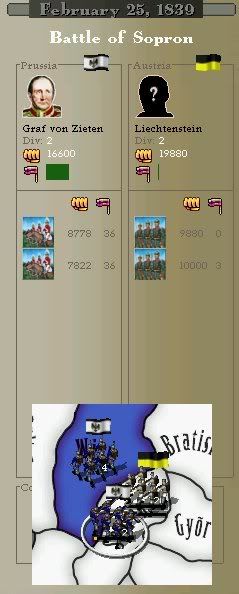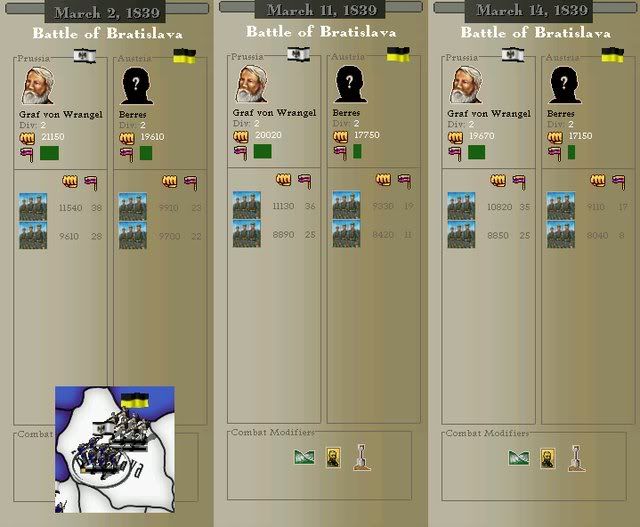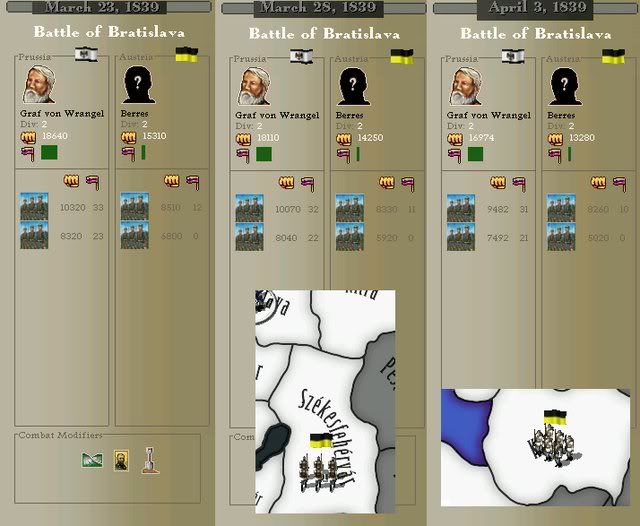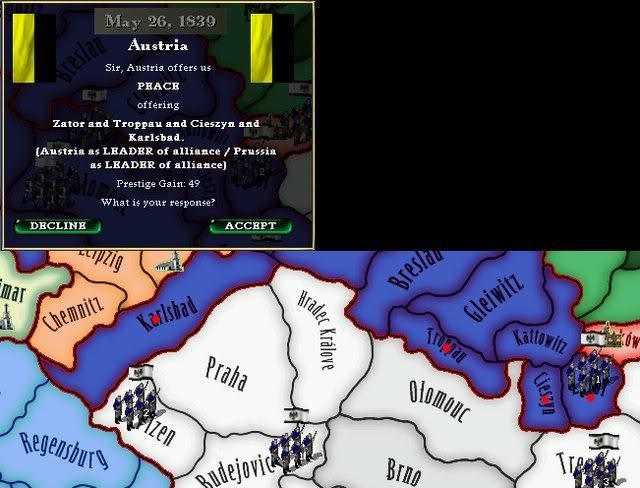1838: Expect the Unexpected
The tired courier that arrived at the door of the Kings private meeting with the high rankers of the Riechstag was most unexpected. He had arrived hot-foot from Austrian Embassy to bring news that none had expected this early. Austria had, on November 29th, declared war on the Free City of Kraków and had begun marching cavalry troopers into the city and the surrounding countryside. This meant that the Prussian King now had to make a split second decision to either go to war with Austria and uphold the Gaurentee of Independence or decide that it was too early and call the plans, temporarily, off. The King quickly consulted those ministers that were with him at the time as it would have taken too long to assemble the entire Riechstag and make a choice.
The King had several things to consider. Firstly, the time that the decleration had come. This was far too early; Bismarck had not reported this to happen until at least late 1839 onwards. Prussian troops were hardly placed to meet any Austrian troops there may have been lurking in Bohemia and Moravia. The plans for war with Austria had been designed to be using the whole Prussian Army, nearing on forty divisions including reserves, to bash their way through the Austrian defences and take Vienna as quickly as possible. However, at the time, the Army had a mere eight divisions on the Austrian border with the rest of the Army still marching south from Poland. As for the reserves, they would take time to mobilize, and disaster might have already struck by the time they had been able to do this. Prussia was simply not ready to go to war.
However, if he let the Austrians take Kraków, there would be no other way of taking on Austria without angering the Confederation. Kraków was the only way to get at Austria. If Wilhelm did cancel the operations this time, the chance for something even remotely similar might have gone as the Austrians would most likely incorperate Kraków into the Hapsburg Empire if no one stood up for them. Therefore, the King could do nothing but inform the Austrian ambassador that if Austrian troops did not leave Kraków, which he knew they would not, in a week, then a state of war would exist between Prussia and Austria. The ambassador laughed at the suggestion of Austria troops backing down at the demand of a less important German nation. Therefore the ambassador was informed that if that was the mood the Confederation leader was too take, then there would be no need to wait a week to start hostilities. On the night of the 29th, Prussian troops marched into Bohemia.
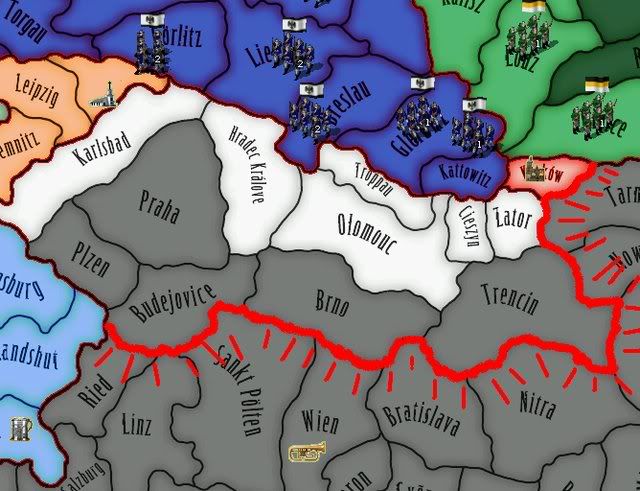
The Prussian Defensive Plan
A new plan was quickly formulated but was mostly made on the go by the Generals. The basics of it was to make best use of the few resources Prussia had on hand at the time. Arrayed along the Bohemian and Slovakian Mountains, running throught the Carpathians, would be General von Zieten's I. Cavalry Korps, General von Goeben's II. Korps and two other independant Divisions. These made up most of the troops that were in Silesia at the time. They would rush through Austrian territory to take up the best defensive positions along the mountains and make Bohemia open to the rest of the army until it got there. One of the Dragoons would also secure Kraków from Austrian occupation, though the flat ground a little tree cover made it a hard place to defend. Using this plan, the Prussian's could quickly secure Bohemia and Moravia while striking deep into Austrian territory before they knew what had hit them. The reserves would also be mobilized, though it was doubtful if they would be much use. The twenty-eigth reserve divisons would take all of December and the best part of January to be mobilized and would likely not all see much action.
The advance began and by December 21st, General von Zieten was entering Brno. To his surprise, he had met no oposition until two divisions of Austrian infantry hoved into view marching towards the town. Von Zieten took tp the attack and immideately charged towards the oncoming infantry. Admitedly, charging two divisions of Infantry is not normally a clever thing to do, but this time it worked perfectly. The Austrians were not at all prepared for any battle. They were formed in columns and could not have begun to imagine that such a large force of cavalry could be so far within Austrian territory. They quickly routed with both sides taking few casualties. When questioned, prisoners revealed that they were from General Angeli's Corps, most of the troop being new recruits. Perhaps, if he was quick enough, Von Zieten could chase them all the way back and through Vienna, taking the city in a mere two months. However, first he had to secure Brno so the main columns of infantry, about seventy miles behind them, now entering Bohemia, would have easy passage into the Austrian heartland.
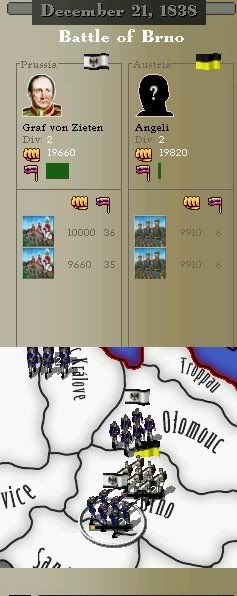
The scuffle at Brno
Casualties:
Prussian ~ 400
Austrian ~ 200
Securing Brno and the surrounding areas took longer than Zieten had imagined, and it was not until late January that he got word from Berlin that the Infantry were now close enough for him to ride of Vienna, now defended by Angeli's demoralized Corps. It was decided that Von Goeben's Infantry would march straight through Brno and assist Zieten in the capture of Vienna. It would leave a big gap in the Prussian lines, but the prize was worth the risk. The situation by this time was favourable enough anyway. Other units were almost complete in securing the entire front and more troops were arriving from Poland by the hour. It would not be long before Prague fell.
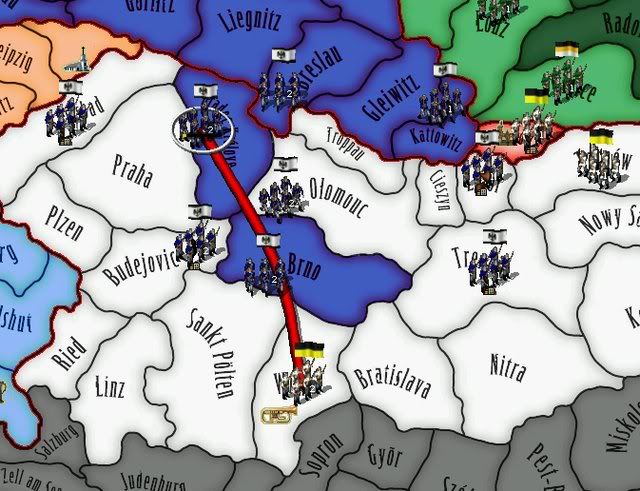
The Situation of the Front, January 21st 1839
On January 25th, the first reserve divisions arrived at the front. Four were sent to Brno and then would march on Vienna. They had overtaken Von Goeben's slow artillery and would now take over his job as Von Goeben took over the defence of the Brno area. As this was happening, Von Zieten had finally enaged with Angeli for a second time outside Vienna. Angeli had the terrain and entrenchments on his side, but his troops had not yet recovered from their defeat in the skirmish near Brno. The sight of the same cavalry did no good effects for the Austrian troops. However, after less than a week of on and off combat, von Zieten was getting the worst of the fighting. Admitedly, if he held the Austrians would eventually run, but he had taken almost 3,000 casualties too the Austrian's 500. However, the tides turned on February second when the four reserve divisons arrived, making the odds 3 to 1. Angeli decided not to waste his troops, even if it was to defend the Capital, and retreated back to Sopron. Vienna was taken a few days later.

The Battle of Vienna
Casualties:
Prussian ~ 3,000
Austrian ~ 500
Another battle was going on to help secure the place that the two nations were, supposedly, fighting over. The Prussian Dragoons had come near to Kraków with high hopes before recognising that the city was infact under seige from Austrian cavalry. The Dragoons went straight into battle, their heavier armament giving them a significant advantage over the cavalry in terrain that gave no advantage to either side. However, even if the Austrians were taking more casualties, a cavalry charge did much more to break morale than a skirmish with rifles did. The Dragoons were more likely to break, and hence the four reserve divisions were sent in to assist in the defeat of the Austrian cavalry. Maj. General Wolf decided it best to vacate the seige of Kraków and head back into Gallacia.
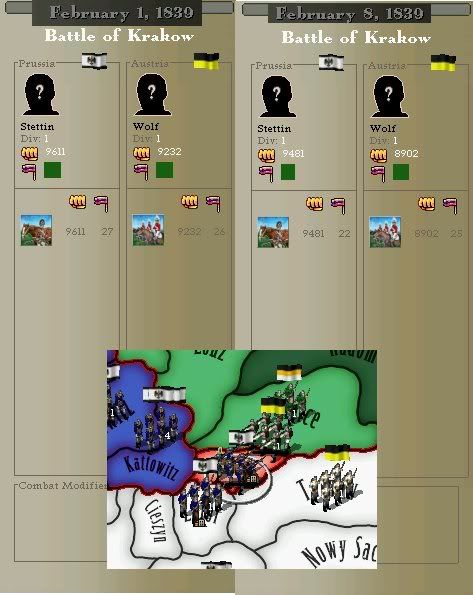
The Seige of Kraków
Casualties:
Prussian ~ 500
Austrian ~ 1,000
By February 19th, the situation was most favourable to the Prussians. Bohemia and Moravia, as well as Vienna and northern Slovakia, were in Prussian hands and Kraków was still independant. The army had all arrived in the war zone and the Austrian troops were in no position to counter-attack anywhere along the line. The Prussian would continue to use this advantage to keep to offensive and grab as much land as possible. However, peace was not yet secured, not even yet in negotiation, so the war would go on for several more months.
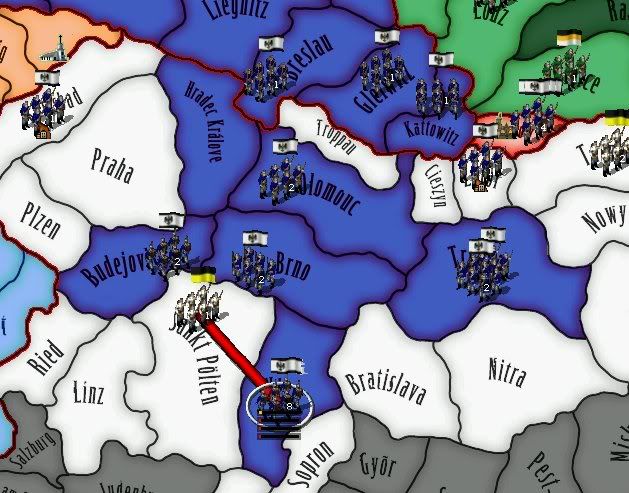
The Situation of the Front, February 19th 1839
The tired courier that arrived at the door of the Kings private meeting with the high rankers of the Riechstag was most unexpected. He had arrived hot-foot from Austrian Embassy to bring news that none had expected this early. Austria had, on November 29th, declared war on the Free City of Kraków and had begun marching cavalry troopers into the city and the surrounding countryside. This meant that the Prussian King now had to make a split second decision to either go to war with Austria and uphold the Gaurentee of Independence or decide that it was too early and call the plans, temporarily, off. The King quickly consulted those ministers that were with him at the time as it would have taken too long to assemble the entire Riechstag and make a choice.
The King had several things to consider. Firstly, the time that the decleration had come. This was far too early; Bismarck had not reported this to happen until at least late 1839 onwards. Prussian troops were hardly placed to meet any Austrian troops there may have been lurking in Bohemia and Moravia. The plans for war with Austria had been designed to be using the whole Prussian Army, nearing on forty divisions including reserves, to bash their way through the Austrian defences and take Vienna as quickly as possible. However, at the time, the Army had a mere eight divisions on the Austrian border with the rest of the Army still marching south from Poland. As for the reserves, they would take time to mobilize, and disaster might have already struck by the time they had been able to do this. Prussia was simply not ready to go to war.
However, if he let the Austrians take Kraków, there would be no other way of taking on Austria without angering the Confederation. Kraków was the only way to get at Austria. If Wilhelm did cancel the operations this time, the chance for something even remotely similar might have gone as the Austrians would most likely incorperate Kraków into the Hapsburg Empire if no one stood up for them. Therefore, the King could do nothing but inform the Austrian ambassador that if Austrian troops did not leave Kraków, which he knew they would not, in a week, then a state of war would exist between Prussia and Austria. The ambassador laughed at the suggestion of Austria troops backing down at the demand of a less important German nation. Therefore the ambassador was informed that if that was the mood the Confederation leader was too take, then there would be no need to wait a week to start hostilities. On the night of the 29th, Prussian troops marched into Bohemia.

The Prussian Defensive Plan
A new plan was quickly formulated but was mostly made on the go by the Generals. The basics of it was to make best use of the few resources Prussia had on hand at the time. Arrayed along the Bohemian and Slovakian Mountains, running throught the Carpathians, would be General von Zieten's I. Cavalry Korps, General von Goeben's II. Korps and two other independant Divisions. These made up most of the troops that were in Silesia at the time. They would rush through Austrian territory to take up the best defensive positions along the mountains and make Bohemia open to the rest of the army until it got there. One of the Dragoons would also secure Kraków from Austrian occupation, though the flat ground a little tree cover made it a hard place to defend. Using this plan, the Prussian's could quickly secure Bohemia and Moravia while striking deep into Austrian territory before they knew what had hit them. The reserves would also be mobilized, though it was doubtful if they would be much use. The twenty-eigth reserve divisons would take all of December and the best part of January to be mobilized and would likely not all see much action.
The advance began and by December 21st, General von Zieten was entering Brno. To his surprise, he had met no oposition until two divisions of Austrian infantry hoved into view marching towards the town. Von Zieten took tp the attack and immideately charged towards the oncoming infantry. Admitedly, charging two divisions of Infantry is not normally a clever thing to do, but this time it worked perfectly. The Austrians were not at all prepared for any battle. They were formed in columns and could not have begun to imagine that such a large force of cavalry could be so far within Austrian territory. They quickly routed with both sides taking few casualties. When questioned, prisoners revealed that they were from General Angeli's Corps, most of the troop being new recruits. Perhaps, if he was quick enough, Von Zieten could chase them all the way back and through Vienna, taking the city in a mere two months. However, first he had to secure Brno so the main columns of infantry, about seventy miles behind them, now entering Bohemia, would have easy passage into the Austrian heartland.

The scuffle at Brno
Casualties:
Prussian ~ 400
Austrian ~ 200
Securing Brno and the surrounding areas took longer than Zieten had imagined, and it was not until late January that he got word from Berlin that the Infantry were now close enough for him to ride of Vienna, now defended by Angeli's demoralized Corps. It was decided that Von Goeben's Infantry would march straight through Brno and assist Zieten in the capture of Vienna. It would leave a big gap in the Prussian lines, but the prize was worth the risk. The situation by this time was favourable enough anyway. Other units were almost complete in securing the entire front and more troops were arriving from Poland by the hour. It would not be long before Prague fell.

The Situation of the Front, January 21st 1839
On January 25th, the first reserve divisions arrived at the front. Four were sent to Brno and then would march on Vienna. They had overtaken Von Goeben's slow artillery and would now take over his job as Von Goeben took over the defence of the Brno area. As this was happening, Von Zieten had finally enaged with Angeli for a second time outside Vienna. Angeli had the terrain and entrenchments on his side, but his troops had not yet recovered from their defeat in the skirmish near Brno. The sight of the same cavalry did no good effects for the Austrian troops. However, after less than a week of on and off combat, von Zieten was getting the worst of the fighting. Admitedly, if he held the Austrians would eventually run, but he had taken almost 3,000 casualties too the Austrian's 500. However, the tides turned on February second when the four reserve divisons arrived, making the odds 3 to 1. Angeli decided not to waste his troops, even if it was to defend the Capital, and retreated back to Sopron. Vienna was taken a few days later.

The Battle of Vienna
Casualties:
Prussian ~ 3,000
Austrian ~ 500
Another battle was going on to help secure the place that the two nations were, supposedly, fighting over. The Prussian Dragoons had come near to Kraków with high hopes before recognising that the city was infact under seige from Austrian cavalry. The Dragoons went straight into battle, their heavier armament giving them a significant advantage over the cavalry in terrain that gave no advantage to either side. However, even if the Austrians were taking more casualties, a cavalry charge did much more to break morale than a skirmish with rifles did. The Dragoons were more likely to break, and hence the four reserve divisions were sent in to assist in the defeat of the Austrian cavalry. Maj. General Wolf decided it best to vacate the seige of Kraków and head back into Gallacia.

The Seige of Kraków
Casualties:
Prussian ~ 500
Austrian ~ 1,000
By February 19th, the situation was most favourable to the Prussians. Bohemia and Moravia, as well as Vienna and northern Slovakia, were in Prussian hands and Kraków was still independant. The army had all arrived in the war zone and the Austrian troops were in no position to counter-attack anywhere along the line. The Prussian would continue to use this advantage to keep to offensive and grab as much land as possible. However, peace was not yet secured, not even yet in negotiation, so the war would go on for several more months.

The Situation of the Front, February 19th 1839
Last edited:


